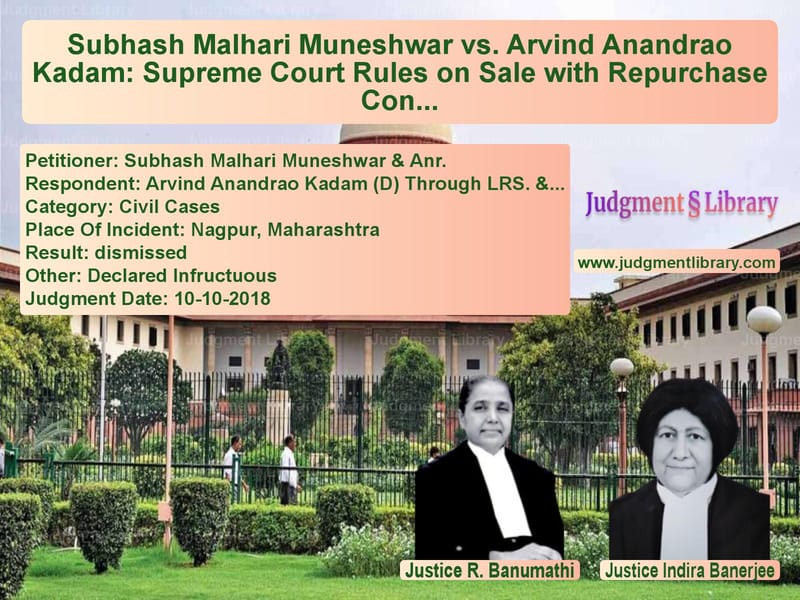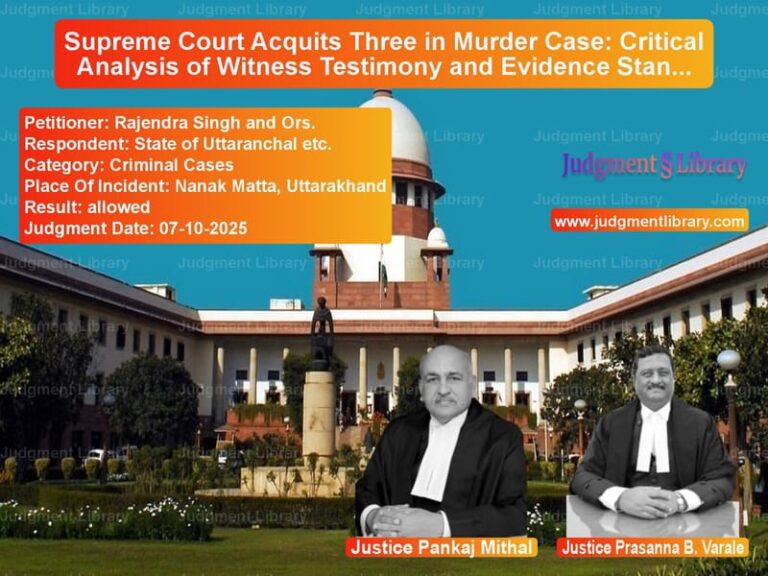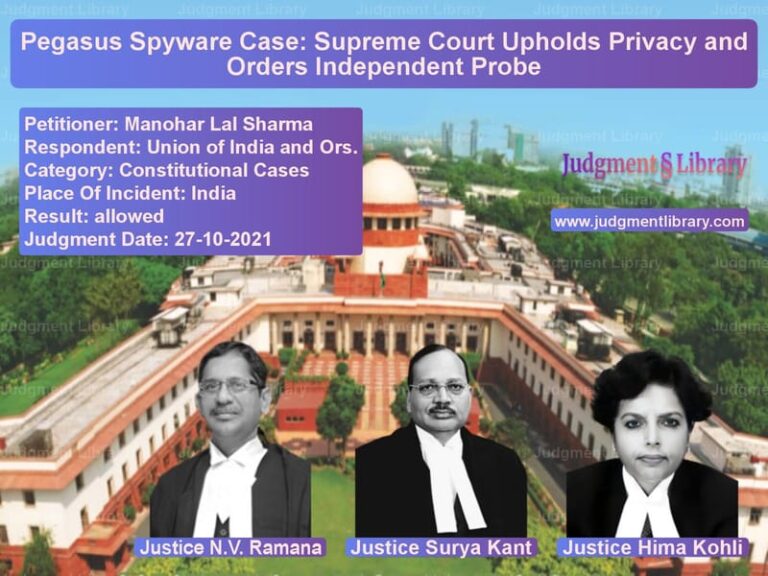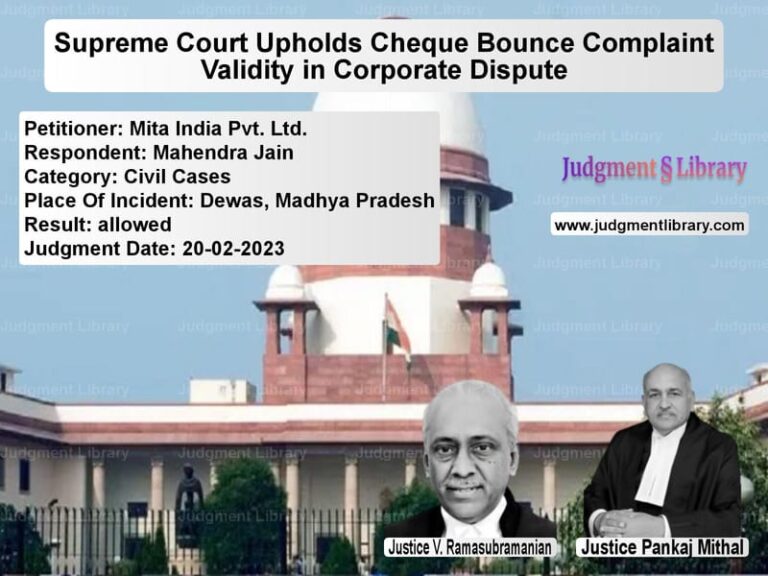Subhash Malhari Muneshwar vs. Arvind Anandrao Kadam: Supreme Court Rules on Sale with Repurchase Condition
The case of Subhash Malhari Muneshwar & Anr. vs. Arvind Anandrao Kadam (D) Through LRS. & Anr. is a significant ruling by the Supreme Court of India concerning the interpretation of a property transaction under the Transfer of Property Act, 1882. The Court, in its judgment dated 10th October 2018, ruled that the disputed document was a sale deed with a condition for repurchase and not a mortgage by conditional sale.
Background of the Case
The dispute arose from a property transaction executed under Exhibit P-33 dated 15th February 1975, where the appellants had transferred land to the respondent. The appellants claimed that the transaction was a mortgage by conditional sale, allowing them to redeem the property upon repayment of the loan amount by 15th March 1980. The respondents, however, contended that the document was a sale deed with a condition for repurchase, giving them absolute ownership of the property.
The key issues in the case included:
- Whether the document (Exhibit P-33) constituted a mortgage by conditional sale under Section 58(c) of the Transfer of Property Act.
- Whether the appellants retained any rights to reclaim the property under the purported mortgage agreement.
- The interpretation of the document’s language and its implications for ownership rights.
Decisions by Lower Courts
The Trial Court ruled that Exhibit P-33 was a sale deed with a condition for repurchase, rejecting the appellants’ claim of a mortgage. However, the First Appellate Court overturned this decision, holding that the document was a mortgage by conditional sale, allowing the appellants to redeem the property.
Upon appeal, the Bombay High Court, Nagpur Bench, reversed the First Appellate Court’s decision, reinstating the Trial Court’s finding that the transaction was a sale with a repurchase condition rather than a mortgage.
Arguments Before the Supreme Court
Arguments by the Appellants (Subhash Malhari Muneshwar & Anr.)
The appellants contended that:
- The language of Exhibit P-33 indicated a mortgage by conditional sale.
- The document included a provision allowing the appellants to repurchase the property, which was characteristic of a mortgage.
- The property was transferred as security for a loan and was never intended to be an absolute sale.
- The First Appellate Court correctly interpreted the document and should not have been overruled by the High Court.
Arguments by the Respondents (Arvind Anandrao Kadam & Ors.)
The respondents countered that:
- The document clearly described an absolute sale with a condition for repurchase.
- The possession of the property was transferred to the respondents, which was inconsistent with a mortgage.
- The appellants failed to prove that the transaction was intended as a mortgage.
- Based on the doctrine of merger, the High Court’s decision correctly established that the appellants had no further rights over the property.
Supreme Court Judgment
The Supreme Court ruled in favor of the respondents and upheld the High Court’s judgment that Exhibit P-33 was a sale deed with a condition for repurchase. The Court made several key observations:
- The recitals in Exhibit P-33 made it clear that the transaction was an absolute sale.
- The transfer of possession and ownership to the respondents contradicted the appellants’ claim of a mortgage.
- The agreement did not specify that the property was given as security for a debt, which is a crucial element of a mortgage.
- The High Court correctly applied legal principles to determine the nature of the transaction.
Key Observations by the Supreme Court
The Supreme Court stated:
“The recitals in the document that transfer of interest with vesting of absolute rights upon the respondents are clear indications that the document is only a sale with condition for repurchase.”
The Court further emphasized:
“The document does not contain any recital as to enjoyment of the property in lieu of the interest payable on the amount. Any oral evidence adduced in this regard cannot be looked into in view of the prohibition under Section 92 of the Indian Evidence Act.”
Final Judgment
The Supreme Court:
- Dismissed the appeal and upheld the High Court’s ruling.
- Confirmed that the transaction was a sale with a repurchase condition rather than a mortgage.
- Directed that the respondents shall retain full ownership of the property.
Legal Precedents and Significance
This judgment reinforces several important legal principles:
- Interpretation of Property Transactions – The language of a document and its intent determine whether a transaction is a mortgage or a sale.
- Doctrine of Merger – The final judgment of the highest appellate court prevails in determining the nature of a disputed transaction.
- Bar on Oral Evidence – Under Section 92 of the Indian Evidence Act, oral evidence cannot be introduced to contradict a written document.
Conclusion
The case of Subhash Malhari Muneshwar vs. Arvind Anandrao Kadam establishes an important precedent in property law. The Supreme Court’s ruling ensures that transactions are interpreted based on their explicit terms, preventing parties from later claiming alternate legal characterizations. This judgment serves as a valuable reference for future cases involving disputes over property transactions.
Petitioner Name: Subhash Malhari Muneshwar & Anr..Respondent Name: Arvind Anandrao Kadam (D) Through LRS. & Anr..Judgment By: Justice R. Banumathi, Justice Indira Banerjee.Place Of Incident: Nagpur, Maharashtra.Judgment Date: 10-10-2018.
Don’t miss out on the full details! Download the complete judgment in PDF format below and gain valuable insights instantly!
Download Judgment: Subhash Malhari Mune vs Arvind Anandrao Kada Supreme Court of India Judgment Dated 10-10-2018.pdf
Direct Downlaod Judgment: Direct downlaod this Judgment
See all petitions in Property Disputes
See all petitions in Landlord-Tenant Disputes
See all petitions in Judgment by R. Banumathi
See all petitions in Judgment by Indira Banerjee
See all petitions in dismissed
See all petitions in Declared Infructuous
See all petitions in supreme court of India judgments October 2018
See all petitions in 2018 judgments
See all posts in Civil Cases Category
See all allowed petitions in Civil Cases Category
See all Dismissed petitions in Civil Cases Category
See all partially allowed petitions in Civil Cases Category







